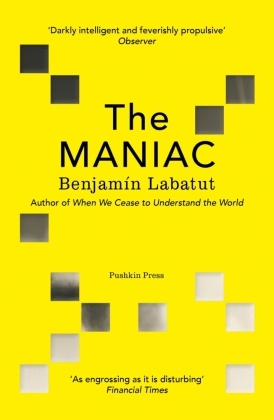
| Verlag | Pushkin Press |
| Auflage | 2024 |
| Seiten | 320 |
| Format | 13,0 x 3,0 x 19,8 cm |
| Gewicht | 328 g |
| Artikeltyp | Englisches Buch |
| EAN | 9781782279822 |
| Bestell-Nr | 78227982UA |
MANIAC erzählt von den Träumen und Albträumen des vergangenen Jahrhunderts. Von seinen kühnsten Denkern und ihren abgründigsten Hinterlassenschaften. Es beginnt mit John von Neumann - einer der Väter der Atombombe, Erfinder der Spieltheorie und Pionier der künstlichen Intelligenz. Und endet mit einer der großen Fragen unserer Gegenwart: Können wir Menschen unser Verschwinden doch noch verhindern?
Er ist ein so bewundertes wie gefürchtetes Ausnahmetalent. Der Pionier der Künstlichen Intelligenz, der Vordenker des Personal Computers, der Erfinder der Spieltheorie und Geburtshelfer der Atombombe beim Manhattan-Projekt: John von Neumann. Sein Wirken umfasst das 20. Jahrhundert, seine Geschichte handelt von einem exzentrischen Geist, der alle Grenzen des Denkbaren sprengt und die Welt aus den Fugen hebt.
Auf meisterhafte Art verknüpft MANIAC John von Neumanns Schicksal mit dem des gepeinigten Physikers Paul Ehrenfest, der im Deutschland der 1930er Jahre zunehmend panisch den Einzug des tyrannischen Irrationalen vorhersieht, und endet mit einem Zweikampf zwischen Mensch und Maschine: dem weltbesten koreanischen Go-Spieler Lee Sedol und der Künstlichen Intelligenz AlphaGo. In ihr kulminiert die Vision von Neumanns: eine autonome Maschine, eine Intelligenz, die sich gänzlich der menschlichen Kontrolle entzieht.
Darkly absorbing . . . A brooding, heady narrative that is addictively interesting. Wall Street Journal From one of contemporary literature s most exciting new voices, a haunting story centered on the Hungarian polymath John von Neumann, tracing the impact of his singular legacy on the dreams and nightmares of the twentieth century and the nascent age of AI Benjamín Labatut s When We Cease to Understand the World electrified a global readership. A Booker Prize and National Book Award finalist, and one of the New York Times Ten Best Books of the Year, it explored the life and thought of a clutch of mathematicians and physicists who took science to strange and sometimes dangerous new realms. In The MANIAC, Labatut has created a tour de force on an even grander scale. A prodigy whose gifts terrified the people around him, John von Neumann transformed every field he touched, inventing game theory and the first programable computer, and pioneering AI, digital life, and cellular automat a. Through a chorus of family members, friends, colleagues, and rivals, Labatut shows us the evolution of a mind unmatched and of a body of work that has unmoored the world in its wake. The MANIAC places von Neumann at the center of a literary triptych that begins with Paul Ehrenfest, an Austrian physicist and friend of Einstein, who fell into despair when he saw science and technology become tyrannical forces; it ends a hundred years later, in the showdown between the South Korean Go Master Lee Sedol and the AI program AlphaGo, an encounter embodying the central question of von Neumann's most ambitious unfinished project: the creation of a self-reproducing machine, an intelligence able to evolve beyond human understanding or control. A work of beauty and fabulous momentum, The MANIAC confronts us with the deepest questions we face as a species.
